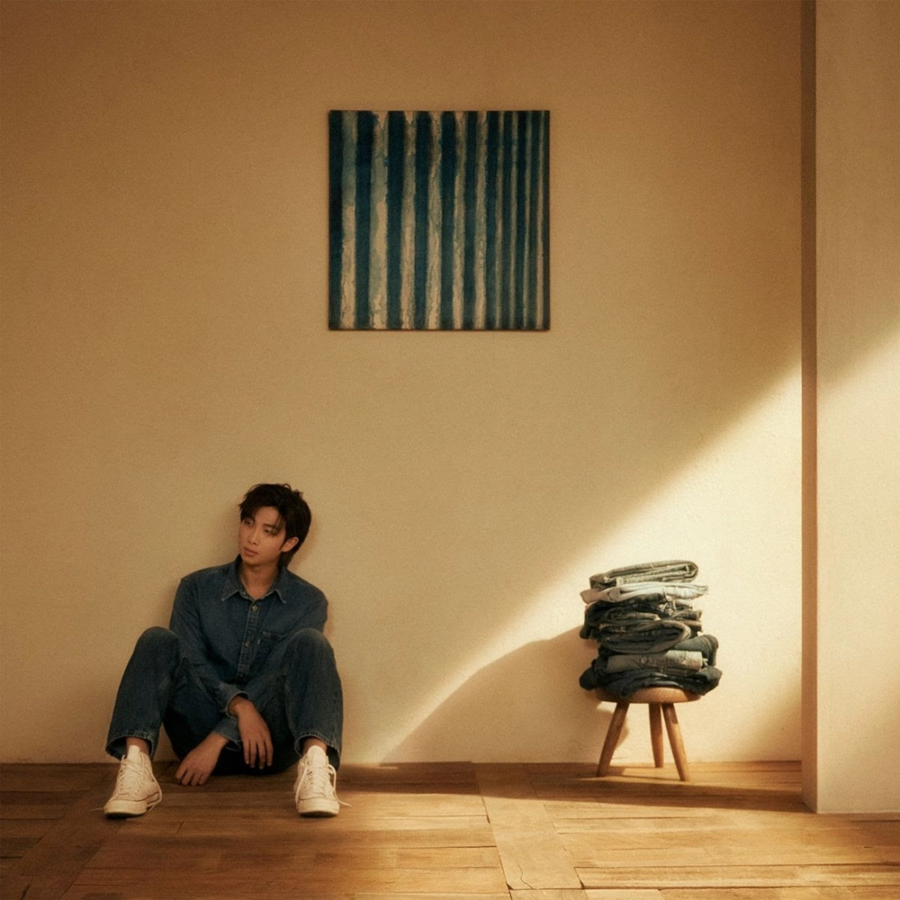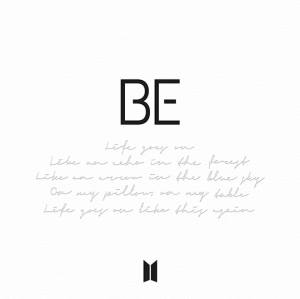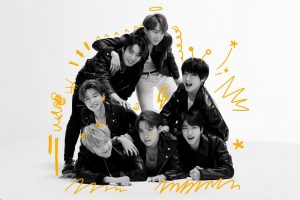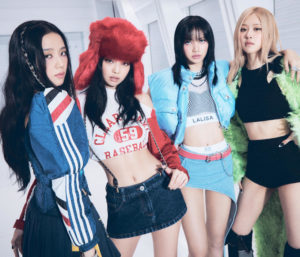RM’s ‘Indigo’ paints him in shades of growth and vulnerability with a memorable solo debut
Courtesy of RM and Big Hit Entertainment
RM’s ‘Indigo’ features artwork from Yun Hyeong-kun on the album cover
December 12, 2022
In his highly anticipated debut solo album “Indigo,” RM (Kim Namjoon) immortalizes his thoughts on growing older and breaking away from his career in the K-pop band BTS. Advertised as the “last archive of [his] twenties” and a “documentation of [his] youth in the moment of independent phase,” the album centers mainly on RM’s struggles with fame, identity and the passage of time.
For the past 10 years, RM has produced music as part of BTS, who announced their break from group activities on June 14. “Indigo” is RM’s first official solo release, following fellow group members J-Hope and Jin’s solo debuts with “Jack in the Box’’ and “The Astronaut,” respectively. The releases have allowed each member to express their own individual styles, with RM leaning into his rap background while J-Hope produced hip-hop songs. RM’s previous solo releases, mixtapes “RM” in 2015 and “mono” in 2018, relied on shades of black and white to reveal RM’s musical talents. However, in “Indigo,” RM uses the titular color as a central theme to represent his personal growth. With an upcoming mandatory military enlistment and an indefinite break from BTS ahead of him, RM seems to have produced “Indigo” as an ode to his youth. Switching seamlessly between English and Korean, rap and song, joy and regret, RM delivers a timeless album revealing shades of himself in the color indigo.
RM’s ten-track album begins with “Yun” featuring R&B legend Erykah Badu. Named after RM’s favorite painter, Yun Hyeong-kun, the song starts with a voice recording of Yun recounting his belief that humanity is, by nature, inclined to seek the truth. RM artfully combines Yun’s ideas with his own as Badu’s voice floats high and sweet above his rap: “I want to be a human / before I do some art.” RM’s lyrics reveal that, in accordance with Yun’s beliefs, it is his nature to search for the truth of who he is as an individual before he focuses on his interests in art, history and songwriting.
The second track, “Still Life,” featuring Anderson .Paak, conveys RM’s relentless forward momentum with the same aptitude as “Yun.” In “Still Life,” RM blends this sense of constant motion with an upbeat cheeriness that reassures his audience that he’s not done with music, even if the future of BTS looks uncertain. “I’m still life,” .Paak and RM sing, “but I’m moving.”
The title “Still Life” comes from the still life art form, which, according to the Getty Museum, describes “a work of art that shows inanimate objects from the natural or man-made world.” The song’s title juxtaposes RM’s constant busy career with the inherent inaction of this type of art. It also incorporates the idea that by painting something in “Still Life,” one is also preserving it.
In an interview, RM explained that “Still life means an inanimate object. As a nonnative English speaker, I interpreted the words as ‘Life Still Goes On.’ Even though the picture is stationary in frame, it is still alive. I wanted to talk about life ongoing, moving away from fixed canvas.” The song portrays the concept of this continuous drive forward with beautiful lyrics and a catchy beat that reveal RM’s optimistic outlook on the future.
The next track, “All Day (with TABLO),” conveys the same upbeat motivation as “Still Life”’ through RM’s confident rap. The song samples BTS’s previous release, “UGH!,” a diss track directed at the group’s critics. However, “All Day” has a more relaxed, smooth sound that reflects RM’s pledge to live in the present and “find the real [him].” RM has never shied away from discussing his struggles with separating his inner self with his stage persona, which is what “All Day” dwells on. The track is both a celebration of his progress and a promise to be even more honest with himself in the future.
In the fourth track, “Forg_tful” (with South Korean singer-songwriter Kim Sawol), RM assumes a softer, more forlorn tone to discuss his disappearing youth. Lyrics like “I’m only just twenty-six / Why can’t I remember?” touch on RM’s struggles with the passage of time and hint at the common yet deeply personal fear of growing older. The song also reveals RM’s efforts at recalling parts of the past he has forgotten, like the smell of the grass when he was younger, while staying in touch with the present. “Forg_tful” has a comforting whistle-like melody threaded throughout the lyrics that accents RM and Kim Sawol’s smooth, quieter vocals in the ballad-like track. By the end of the song, Kim Sawol dismisses RM’s worries, saying, “Yes, just forget about it / Everyone here is a fool,” making “Forg_tful” a comforting, calm track to circle back to for reassurance.
The fifth track, “Closer” (with R&B singer Mahalia and hip-hop artist Paul Blanco), is a soulful love song depicting a rocky relationship in which RM wishes that his partner would just “stay where [they] are” in order for the two to maintain their relationship. Despite the heartache, Mahalia and Paul Blanco’s high tones contrast with RM’s deep voice to make the song balanced and enjoyable.
In the sixth track, “Change pt.2” RM is finally alone with his thoughts. Though he refers to “Indigo” as a record of his “independent phase,” the ten-track album only has two songs, “Change pt.2” and “Lonely,” that do not feature any other artists. “Change pt.2” is a sequel to the song “Change,” which RM released in 2017. While its predecessor focused more seriously on political and social change. “Change pt.2” reveals RM’s belief that change is necessary and beneficial with an angry, bitter edge. “Things change, people change / everything change,” he says, shaking off the constraints of who he used to be and targeting critics. The song starts off rough and harsh before giving way to a steadier, smoother beat as RM lets go of his anger and decides to just live with how he’s grown. Its techno beat and repetitive lyrics help highlight the fact that RM, like all people, has evolved.
The next track, “Lonely,” feels like a brand new genre. Beginning with upbeat guitar instrumentals, “Lonely” provides an example of the refreshing versatility of “Indigo.” Despite the song’s seeming cheeriness, the lyrics reveal a more morose blue shade of RM as he sings that he’s “f***** lonely.” RM’s confession is that he, too, feels alone sometimes, making “Lonely” a relatable yet vulnerable snapshot of his twenties.
“Hectic (with Colde)” reveals, in softer tones, RM’s love-hate relationship with his popularity. Similar to “Still Life,” RM discusses how his career leaves him little time to focus on himself in “Hectic.” With Colde, RM describes his attempts at keeping up with the busy world around him in a soothing and relatable track.
The climax of “Indigo” is its ninth track, “Wild Flower (with youjeen),” a song that cements RM’s status as a musician and poet. “No name, that’s where I’m at,” RM says, refusing to confine himself to one “name” and denying BTS’ fame and status as temporary and fleeting. RM wants to make sure that his career doesn’t burn out like a firework, but withstands the passage of time like a wildflower. Youjeen highlights the primal feeling behind his struggles with his legacy as her powerful voice soars, hitting high notes in the chorus between RM’s rap with an intensity and breathlessness that gives “Wild Flower” its spot as the most popular track on the album.
The music video for “Wild Flower” is fittingly simple, with alternating visuals of RM laying in a purple flower field and in a concert venue surrounded by fans. In “Wild Flower,” RM reveals how far he’s come from producing his first mixtape seven years ago. He has established his name as a talented lyricist, musician and artist through vulnerable, beautiful songs like “Wild Flower.”
The last song of the album is “No. 2 (with Park Jiyoon).” In this song, RM promises not to look back on the past: a necessary, yet unspoken message. The song tells listeners that they’ve “done their best” and should “not look back no more.” Its consoling vocals provide the perfect conclusion for the album, bringing tears to the eyes of listeners.
In “Indigo,” RM breaks away from his previous records to establish a name for himself that is wholly his own, yet always changing and growing. With the prevailing themes of getting older and leaving behind your youth, the album describes experiences that nearly everyone can relate to with the talent that has always underscored RM’s records, from his very first mixtape to solo releases under BTS like “Intro: Persona” and “Trivia: Love.”
In his newest album, RM continues to use his platform to give comfort and share intimacy. Like a true art piece, this album is no longer just his, but also an album that he hoped listeners could take, interpret and find solace in. “Indigo” is RM’s gallery of his twenties and it shares various shades of himself. Every song is a painting of its own and with RM’s sharp vocals, polished production skills and passionate lyrics, it makes the perfect archive-like album.






